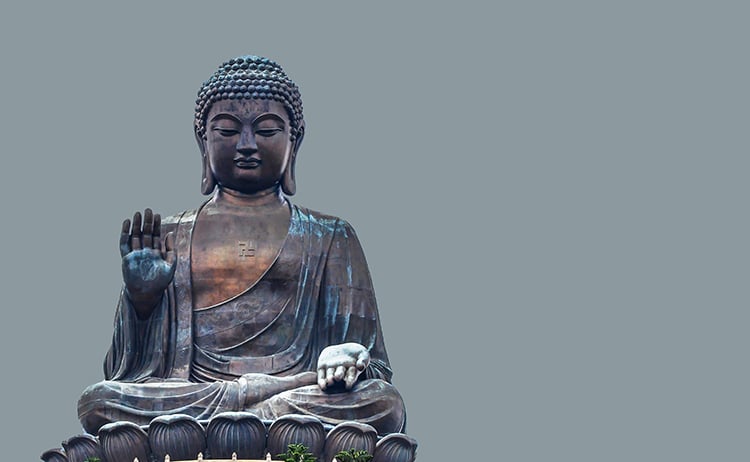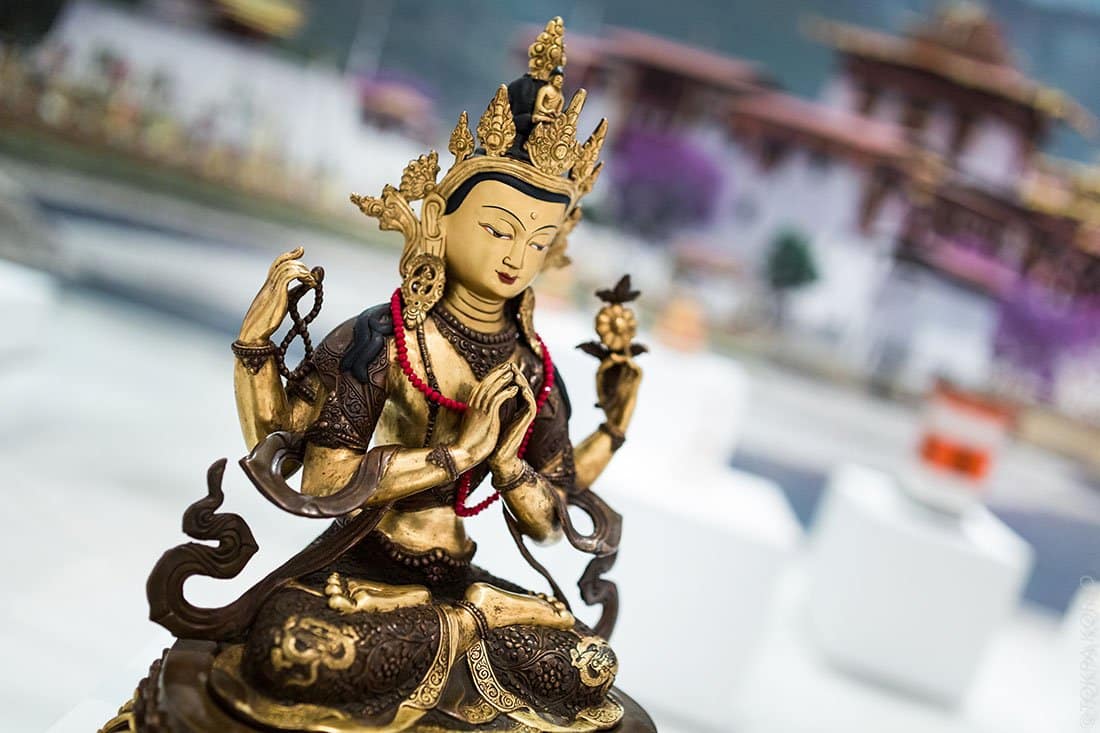The Six Paramitas
Category: Buddhist Path | Mind Trainer Articles | Popular | Recent Meditation Posts

A brief overview of Mahayana practice
The word paramita is often translated as “perfection” or “transcendent quality.” If we look at the Sanskrit roots, we can break it down into para: the far bank or shore; beyond, and mita: gone to or arrived at. So paramitas are transcendent qualities that, once reached or perfected, are beyond the usual, beyond the ordinary.
Traditionally, it is understood that there are six main families of qualities that are to be developed on the bodhisattva path. A buddha or highly realized bodhisattva will have perfected them; the rest of us are doing our best to follow in the wise ones’ footsteps as we journey on the path to awakening. What are these qualities? They are generosity, discipline or morality, patience, diligence, concentration, and wisdom. We’ll look at alternative translations for these terms as we present each paramita. While in some systems there are 10 or even 11 paramitas, 6 is the most common classification.
When you’re a fully awakened being, these qualities unfold effortlessly. They define you; they’re who you are. Those of us who have not yet reached the spontaneous effortlessness of that far shore continue along this same journey by developing these same bodhisattva qualities. As Mahayana practitioners, we understand that the ultimate destination of our training is buddhahood and the six paramitas constitute the vessel that carries us there.
The Paramita of Generosity
Generosity is a pretty self-evident quality. We usually think of generosity as the act of giving material things, yet being generous goes beyond the material. The focus of our generosity could be food and/or shelter destined for people or animals in need; it could also be a kind ear, a timely introduction to the Dharma, safety, and other forms of support. The teachings encourage us to give wholeheartedly and with discernment, aware of what will best benefit the recipient.
As we practice generosity, our own self-centeredness and clinging naturally decrease. Rather than focusing on ourselves, we become warmer and more open, more interested in how we can benefit others. This is how generosity embodies the essence of the bodhisattva motivation.
The Paramita of Ethical discipline
The second paramita, which is sometimes simply called discipline, can also be translated as ethics, ethical behavior, or morality. You’re on a path and you are willing to recognize the behavioral patterns that impede your progress. You have an idea of where it is you want to go, which qualities you need to develop, and which actions you need to renounce to get there. Ethical disciple means you’re attentively watching how you behave, what you say, and which thoughts you cultivate.
To develop this quality requires a little bit of reflection because we need to understand which actions are positive and lead to positive results, and which actions are negative and lead to harmful results or suffering. This isn’t always as self-evident as we may assume. There are plenty of difficult decisions to be made in life where things aren’t black and white; it’s not always easy to know which direction to take. The guidelines for ethical discipline or morality are mapped out for us so that we have a better idea of how to weigh decisions and refrain from engaging in harmful actions that lead to unwelcome results for ourselves and for others.
The Paramita of Patience
The next quality is patience. Patience is forbearance when faced with frustrations and challenges, whether in one’s meditation practice, in relationships, while studying or working, when out and about in the world, and everything and everywhere else. Patience is a quality that all of us can develop if we set our minds to it, though in the modern world it may be harder because we’re always multitasking and everything has to happen so fast. We can start by taking three conscious breaths when we’re feeling triggered or disgruntled, three breaths to slow down, refocus, and recall our bodhisattva motivation.
Patience is a remedy for anger, irritation, and intolerance. When we interact with people who truly embody the qualities of awakening, we witness how remarkably patient they are. It’s incredibly inspiring to spend time in the presence of people like this.
The Paramita of Diligence
Diligence, also called joyful effort, joyful endeavor, or perseverance, is the fourth transcendent quality. If you’re lazy like I am, this is not going to be a term that inspires you. But the idea behind diligence or joyful effort is that it is joyful. And that’s because you have a goal and you know that the effort you put into studying, practicing, being of benefit to others, and so on—because these actions do sometimes require an effort—is going to bear fruit. You’re on the right path and your efforts are going to help guide you to the other shore, the riverbank of awakening. This is why diligence or perseverance can be joyful. And even when it doesn’t feel that way in the moment, you can remind yourself that ultimately it is.
As we practice, there is a natural progression of our effort. In the beginning it is rather forced and unnatural, but gradually as we accustom ourselves to the practices, they become second nature. Diligence is closely interwoven with all the other paramitas. We apply joyful effort to our generosity because we enjoy helping others. We joyfully avoid engaging in the causes of suffering in our ethical behavior. Patience is a much more joyful state of being than being balled up in irritation. And once we experience the fruit of meditation—concentration and wisdom—in the form of connecting with the spontaneously open present moment, our effort becomes effortless.
The Paramita of Concentration
The fifth paramita or transcendent quality is meditative concentration. You’ve trained and developed the ability to settle your mind on a point and it stays there. When does that ever happen otherwise? If you’ve never thought about your mind and how it functions, there may not be many opportunities for you to develop this quality.
To develop concentration requires a concerted effort because our world is a world of distraction. The whole of consumer society revolves around it, and many people have never considered the benefits of settling the mind. I think about people who grow up watching videos where it’s a different angle every second or two. If that’s what your mind is used to, it’s really hard to imagine that the mind can just stay put.
There’s a joyful effort to be made here as we learn that we can relate to the mind in a very different way. We’re training in settling the mind and going deeper and deeper so that the mind can discover itself. We’re looking inward, staying still, and being present when we need to be. Presence is a quality that develops naturally as we meditate. The paramita of concentration is closely linked to the ability to be present on or off the cushion, on or off the chair.
I was with my heart teacher when one of his students told him that she couldn’t settle her mind. “I just can’t meditate,” she said. “I really don’t even like trying because my mind keeps jumping all over the place.” And I loved his answer because I worked on dairy farms when I was young. “You just imagine that you’re milking a cow,” he said. “You keep your mind present the time it takes to pull the milk out of one teat. It’s as if you’re conscientiously pulling the milk out, then you relax the mind, then again as long as it takes to pull the milk out, and then you relax.” And that’s how we can train in developing concentration.
The Paramita of Wisdom
The sixth paramita, the last one in the list, is the paramita of wisdom. It reposes on our having developed the manifold qualities of meditative concentration. Wisdom is the realization of the true nature of reality, of ourselves, of our minds, of our world—the world that we generally think of as actually existing as we perceive it.
Beyond conditioning, wisdom experiences how things truly are when ego is no longer part of the picture. It’s what’s left when you take you out of awareness. If you’re able to dwell in that, that’s wisdom. Wisdom can express itself in glimmerings, or as a true and profound experience or realization. Wisdom is not something you can manufacture, rather, it’s the discovery of what is now and has always been the true nature of mind.
Wisdom is the transcendent or perfection aspect of all of other paramitas. When we practice generosity, we need a little wisdom to see how important it is to open up and think of others. Similarly, the other paramitas rely on some glimmer of wisdom in order to take the leap beyond small-minded thinking and practice the bodhisattva path. In this way, all of the paramitas are interdependent and inform each other.
And those, in a teeny tiny nutshell, are the six paramitas.







